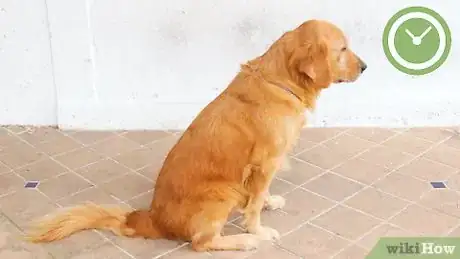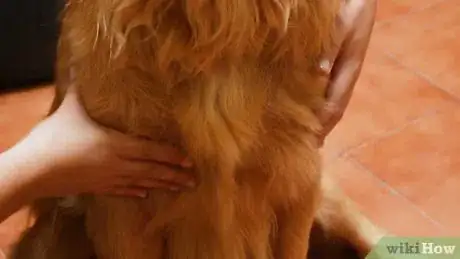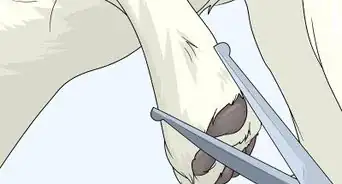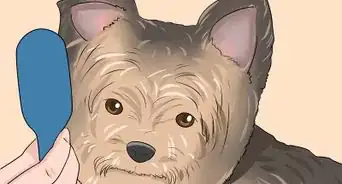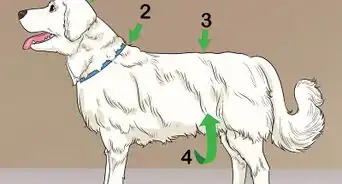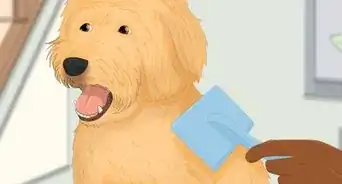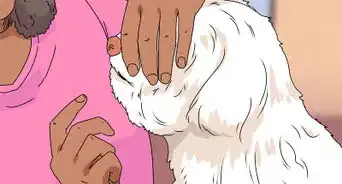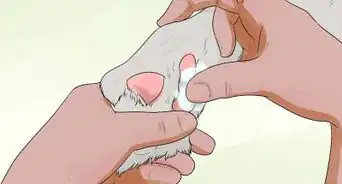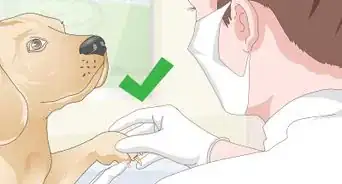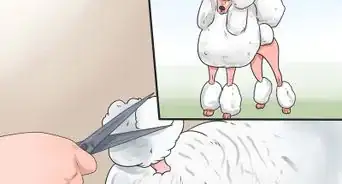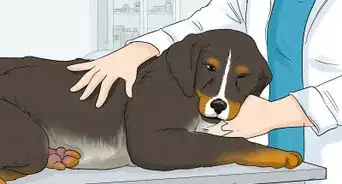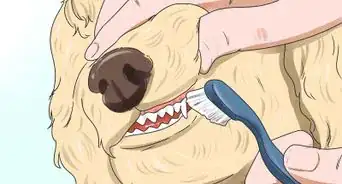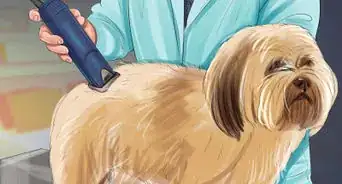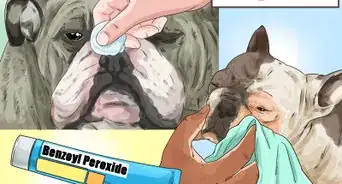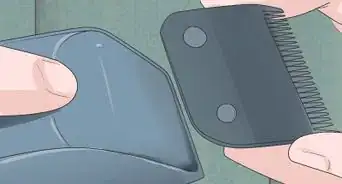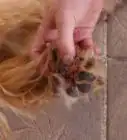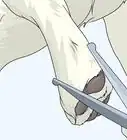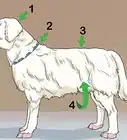This article was co-authored by Marie Lin. Marie Lin is a Licensed Pet Groomer and the Owner of Marie's Pet Grooming, a grooming salon based in New York City. Marie has over 10 years of pet grooming experience specializing in dogs and cats. She earned her pet grooming certification from the American Academy of Pet Grooming New York in 2009 and is also a member of the National Dog Groomers Association of America. She earned a Master of Business Administration (MBA) from Hawaii Pacific University in 2007.
wikiHow marks an article as reader-approved once it receives enough positive feedback. This article received 25 testimonials and 94% of readers who voted found it helpful, earning it our reader-approved status.
This article has been viewed 543,924 times.
Massaging your dog is a great way to bond with your pet and spot potential health problems, like tumors or sore spots, before they get out of hand. Massaging a dog is different from massaging a person; instead of doing a deep tissue massage to loosen muscles, the aim is to use gentle motions that help your pet relax and feel comfortable. Consider pairing massage with a grooming session to help your dog feel healthy, happy and loved.[1]
Steps
Massaging Correctly
-
1Begin with gentle petting. Pet your dog in the spots you know he likes best. This will help him settle down and get relaxed enough to enjoy the massage. Pet him on the head, tummy, back, and other spots using gentle strokes.[2]
- Let your dog sit, lie or stand in a comfortable position.
- Have a calm, relaxed demeanor and speak to your dog in soft tones to help him destress.
-
2Massage the dog's neck. Use the tips of your fingers to make a circular motion just below the head. Apply gentle pressure, but not so much you make your dog uncomfortable.[3]
- If you have a small dog, use smaller motions. For a larger dog, use larger motions.
- Don't press your dog's body so hard that he flinches. Remember, you're not trying to do a deep tissue massage. You just want to rub his body to help him feel calm and bond with him.
Advertisement -
3Move down to the shoulders. Slowly work your way down the neck and to in between his shoulders. This is usually the dog's favorite spot, because it is one of the only places he can't reach himself, so spend extra time there.
-
4Next do the legs and the chest. Some dogs don't like being touched on the legs; if your dog flinches, remove your hands and move to the next part of the body. If he likes it, see if he wants a paw massage, too.
-
5Massage your dog's back. Work your way back up to between the shoulders and slowly travel down the back. Use small circular motions with your fingers on either side of the spine.
-
6Finish with the back legs. Continue massaging until you end up at the base of the tail. Gently massage down the dog's back legs. Continue to the paws if your dog enjoys having his feet picked up.[4]
- You can stretch the dog's back legs to help alleviate the dog's joint stiffness.
Helping Your Dog Feel Comfortable
-
1Massage at a peaceful time of day. Do it during a time when you and your dog are already in a relaxed state of mind, like at the end of the day after dinner. This will make it easier for your dog to relax under your touch.[5]
- Don't massage your dog when he's worked up for some reason or another; it's better to wait until he's already pretty calm.
- Don't massage right after an exercise session; give him a half hour or so to rest first.
- Don't massage your dog if he's not feeling well; simple petting will do, but he might not be up for getting massaged.
-
2Work your way up to a five or ten minute massage. Your dog may not like the massage at first, and it could just be that he's not used to it. See if your dog likes being massaged for about a minute, then work your way up to longer massages. As long as your dog enjoys it, there's no limit to how long you can massage him, but five or ten will give you enough time to massage his whole body thoroughly.
-
3Stop if your dog doesn't like it. The point of a massage is to help your dog feel happy and relaxed, so don't do it if he doesn't like it. If he's happy being massaged, he'll stretch out and breathe easily. If he's not, he may exhibit the following behavior:[6]
- Stiffening when you move from simple petting to massage
- Flinching
- Growling
- Biting at your hand
- Running away
-
4Consider grooming your dog as part of your massage session. Since your dog is already calm and relaxed, it might be a good time to groom him as well.[7] Only do this if your dog actually enjoys the process of being groomed. Otherwise, he'll come to associate massage time with discomfort and anxiety.[8]
- Brush your dog's fur from head to tail
- Trim his nails if they're getting long
- Trim hair that's getting long around the dog's face, legs or tail
Making it a Healthy Ritual
-
1Help ease your dog's arthritis pain. If your dog is on the older side and suffers from arthritis, massage can help. Very gently massage around the area that's affected, using a kneading motion to help relieve the pain. Do not press too hard, and do not massage directly over the affected area.
- You can also gently bend and stretch your dog's legs to help ease the pain.
- Some dogs enjoy this, while others do not. If your dog flinches, don't continue massaging. Forcing it could cause your dog to feel worse instead of better.
-
2Feel for lumps and areas that are inflamed. Massaging your dog regularly is a great way to examine his body for sore spots that might need attention from a vet. Take note of lumps or bruised areas that you haven't noticed before. Pay special attention if your dog yelps when you touch him in a certain spot. If you notice something alarming, take your dog to the vet to have it checked out.
- The best way to feel for lumps is to run your hands over your dog's body in a smooth, long stroke. Feel the stomach, legs, chest, and back. Make sure you don't miss any spots.
-
3Leave deep tissue massage to a professional. If you think your dog could benefit from a good deep tissue massage, make an appointment with the vet. Deep tissue massage can be beneficial for animals, but if you're not intimately familiar with dog anatomy you could actually end up injuring your pet.[9]
Expert Q&A
Did you know you can get expert answers for this article?
Unlock expert answers by supporting wikiHow
-
QuestionIs it good to massage your dog?
 Marie LinMarie Lin is a Licensed Pet Groomer and the Owner of Marie's Pet Grooming, a grooming salon based in New York City. Marie has over 10 years of pet grooming experience specializing in dogs and cats. She earned her pet grooming certification from the American Academy of Pet Grooming New York in 2009 and is also a member of the National Dog Groomers Association of America. She earned a Master of Business Administration (MBA) from Hawaii Pacific University in 2007.
Marie LinMarie Lin is a Licensed Pet Groomer and the Owner of Marie's Pet Grooming, a grooming salon based in New York City. Marie has over 10 years of pet grooming experience specializing in dogs and cats. She earned her pet grooming certification from the American Academy of Pet Grooming New York in 2009 and is also a member of the National Dog Groomers Association of America. She earned a Master of Business Administration (MBA) from Hawaii Pacific University in 2007.
Licensed Pet Groomer
-
QuestionHow do I know if my dog is enjoying it?
 Community AnswerHe/she will be very relaxed, and if you are doing it right, they may even fall asleep. My dog falls asleep and has even started snoring on some occasions.
Community AnswerHe/she will be very relaxed, and if you are doing it right, they may even fall asleep. My dog falls asleep and has even started snoring on some occasions. -
QuestionIs it bad that my dog groans or makes a strange breathing noise if I pet behind his ears?
 Community AnswerIt all depends on what kind of groan it is. Is it aggressive or just a manifestation of pleasure? Many dogs grunt when they're happy or positively stimulated.
Community AnswerIt all depends on what kind of groan it is. Is it aggressive or just a manifestation of pleasure? Many dogs grunt when they're happy or positively stimulated.
wikiHow Video: How to Massage a Dog
Warnings
- Do not apply too much pressure.⧼thumbs_response⧽
- Never forget to put the collar back on after the massage, especially if the dog often runs off without human supervision.⧼thumbs_response⧽
References
- ↑ Marie Lin. Licensed Pet Groomer. Expert Interview. 31 March 2020.
- ↑ https://www.petmd.com/dog/wellness/how-give-your-pet-massage
- ↑ https://www.petmd.com/dog/wellness/how-give-your-pet-massage
- ↑ https://www.petmd.com/dog/wellness/how-give-your-pet-massage
- ↑ https://www.petmd.com/dog/wellness/how-give-your-pet-massage
- ↑ https://www.petmd.com/dog/wellness/how-give-your-pet-massage
- ↑ Marie Lin. Licensed Pet Groomer. Expert Interview. 31 March 2020.
- ↑ https://www.petmd.com/dog/wellness/how-give-your-pet-massage
- ↑ https://www.petmd.com/dog/wellness/how-give-your-pet-massage
About This Article
To massage your dog, wait until it's calm and relaxed. Then, apply gentle pressure to its neck, back, chest, and legs with your fingers while moving them in a circular motion. If your dog stiffens, flinches, or growls, give it some space and try again later. You may need to start out with short, minute-long massages and work your way up to longer massages once your dog feels more comfortable. To learn how to groom your dog while massaging it, keep reading!

